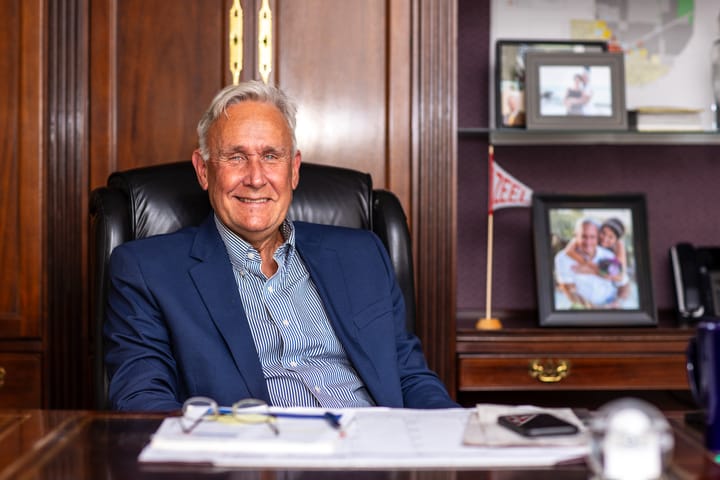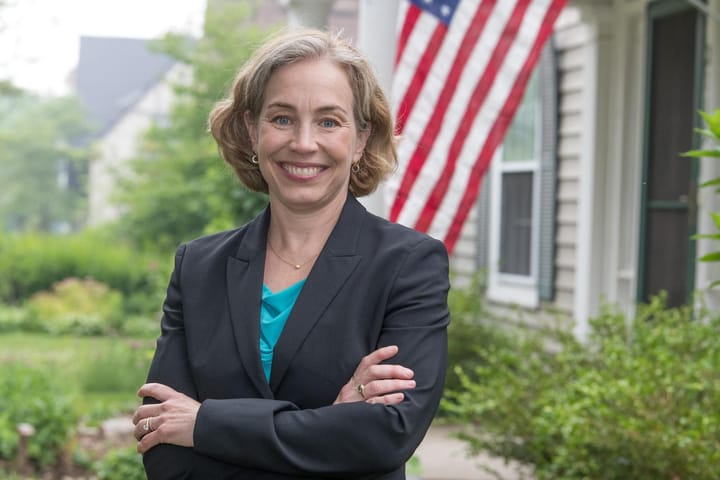Ottawa residents show mounting dissent over Trump's controversial executive orders
West Michigan residents — many with ties to Ottawa County — are voicing their dissent in myriad ways as they hope to push back against the new administration’s rollout of the controversial Project 2025.
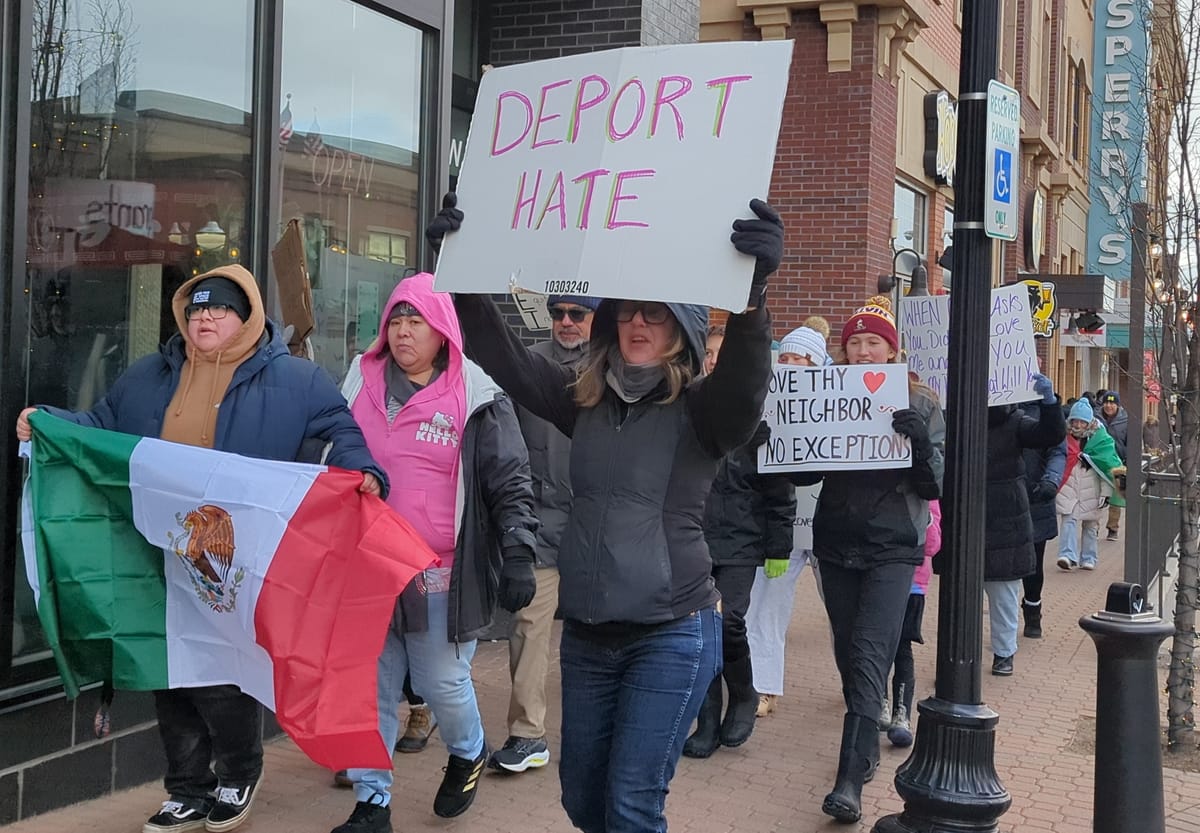
HOLLAND — “No hate. No fear. Immigrants are welcome here.”
That was one of several chants that a group of protesters chanted Sunday, Feb. 9, as they marched along downtown Holland’s Eighth Street to show their support for immigrants in the United States.
It was the latest of several protests in West Michigan since President Donald J. Trump took office last month and has issued a slew of executive orders and directives through his cabinet that have inspired unrest across the country, decrying everything from the president’s immigration crackdown to his rollback of transgender rights and a proposal to forcibly transfer Palestinians from the Gaza Strip.

Now, West Michigan residents — many with ties to Ottawa County — are voicing their dissent in myriad ways as they hope to push back against the new administration’s rollout of the controversial Project 2025, a hard-right playbook for American government and society.
Here’s a rundown of how Ottawa County residents are mobilizing:
Marching for immigrants’ rights
Despite the 25-degree temperature, about 75 Holland-area residents gathered at Civic Center Place on Sunday to march for immigrant rights.
With signs like “No human is illegal” and “Deport hate,” dozens of protesters chanted down Eighth Street, drawing dozens of honking horns and cheers from passersby.
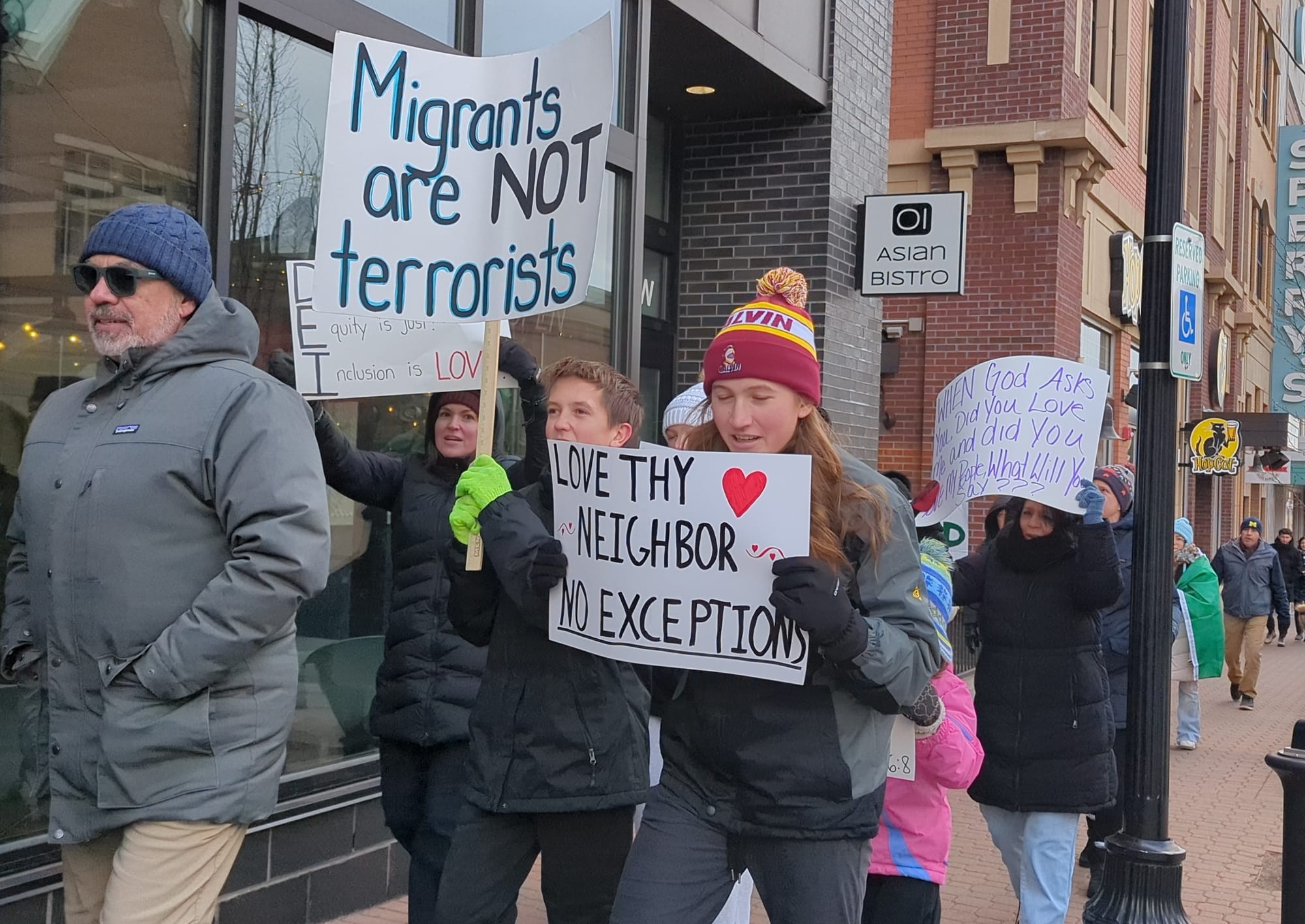
George Fuentes, of Holland, said he braved the frigid temperatures to march with BAMN for those who are living in fear.
“The truth has no color,” he said. “(We were) founded by immigrants. I'm an American citizen. I was born in Holland. I grew up with racism. To the people that are on the other side of the border, we feel their pain, and I would just like to walk for them — just walk for freedom.”
Fuentes, a 30-year-old Latino, said he believes the country’s founders would not support Trump’s stance on immigration.
“I don’t feel like our forefathers would want this. We fought for freedom. This isn't something that even God would like to see,” he said. “This is all of our land. We're here together. We should all be in unity and work as one.”
Enrique Silva, of Holland, said he was marching for those who can’t.
“We're here to raise our voice for the people that are afraid to because they live in the shadows; they cannot come out and speak for themselves,” said Silva, 50.
Silva, a Latino, said he immigrated legally to the U.S. years ago and is now a legal citizen. He said that white Americans have misconceptions of the immigrant experience.
Holland-area residents march down Eighth Street in downtown Holland on Sunday, Feb. 9, 2025, to support immigrant rights. [Video/Sarah Leach]
“I have dealt with a lot of racism, even nowadays, in this new era where we're all God's children … we're still having to put up with racism and just different treatment, just for being a different skin color,” Silva said. I'm here to support all my family, friends and everybody that came here for a better life. We're here to work. We're not here to cause trouble.
“And believe it or not immigrants do pay taxes,” he said. “So a lot of people are under the impression that because they're immigrants and they're illegal, they do not pay taxes and they're here for welfare and we're not.”
It was the third such demonstration organized by the group By Any Means Necessary West Michigan.
Kristen De Ridder, of Holland, said she’s not an immigrant, but she has friends and neighbors who are personally affected by immigration-related issues.
“I just wanted to show up for the other people that were too afraid and couldn't,” said De Ridder, 46. I have a lot of people in my life that I have personal relationships with where this issue affects them, and that might be people that were afraid to go to work, or people that are ministering to those people and helping provide them with resources, people that have documentation, but that documentation is in question now, and so people are really scared.”
BAMN West Michigan’s first march on Feb. 2, which drew about 200 participants, was her first political demonstration.
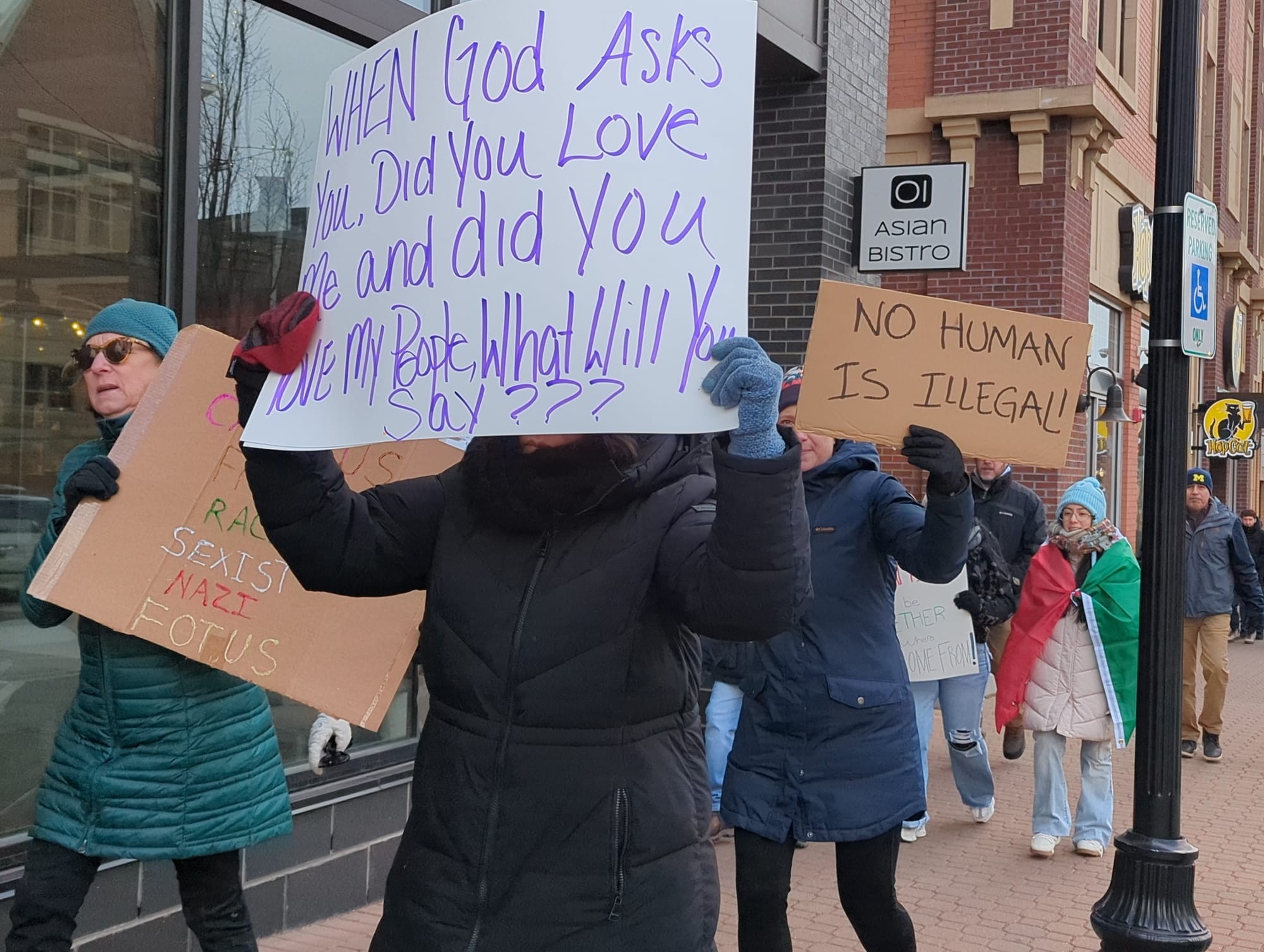
“When you start to hear those personal stories, I guess I just didn't feel comfortable just waiting to see what was going to happen,” said De Ridder, 46, “and being able to be in that space and have all those people kind of in that same situation, with those same feelings, come together and then just show solidarity that we want to support our Latino friends in the Holland community — it was very empowering.”
Kelsey Leslie, of Saugatuck, said she founded BAMN’s West Michigan Chapter after working with the group’s Detroit affiliate.
The phrase “by any means necessary” originally appeared in a 1948 French play, but entered the popular civil rights culture through a speech given by Civil Rights leader Malcolm X when he used the phrase at a rally in 1964.
The BAMN groups formed in the mid-1990s to support affirmative action policies in public universities, with many of its early notable demonstrations involving the University of Michigan and Michigan State University. In 2016, the Detroit chapter helped organize teacher “sick-outs,” as teachers protested poor working conditions in Detroit schools by calling in sick.
Leslie said the group has evolved to be a proponent of civil rights for vulnerable groups. For example, the group plans to support the local LGBTQ community at upcoming summer Pride events.
“I am trying to reach the community and build the community as well,” said Leslie, 24.
She hopes to plan future protests at ICE detention centers in Michigan as well as in Lansing.
“We are going to be doing events to spread our word because even if we do get Trump impeached, our fight is not going to stop there,” she said. “(Vice President) J.D. Vance was bought out by (GOP donor and Silicon Valley billionaire) Peter Thiel. That's the real big fish we have to fry.”
She said BAMN West Michigan will continue to stage weekly protests in the Holland area for the foreseeable future to help sustain awareness.
“It's a very religious town,” she said of Holland, “so when you make a lot of noise on Sundays, people notice.”
To learn more about BAMN West Michigan, visit the group’s Facebook page.
‘A day without immigrants’
Several businesses from day cares to grocery stores and hair salons closed Feb. 3 across the U.S. in a loosely organized day of protest against Trump’s immigration policies.
Restaurants in West Michigan followed suit, urging documented and undocumented citizens to stay home from school and work to keep business closed for the day.
Many local businesses participated in the voluntary protest, including Muskegon's casual Mexican restaurant Isabella’s.
Ramon Gasca, owner of Isabella's Mexican restaurant in Muskegon, announced on Facebook that the restaurant planned to close on Feb. 3 for the nationwide "A day without immigrants" to show support for the West Michigan immigrant community.
“Our work is valuable and we should be valued,” the restaurant announced on its Facebook page prior to the protest.
The restaurant's social media post also insisted that this wasn’t political, but a way to say they're proud of their Latino roots.
“We want to support immigrants because we’re immigrants, too,” owner Ramon Gasca said in the video post. “We support the Latino community all around the world.”
Grand Valley students march over immigration
Students at Grand Valley State University voiced their frustration over Trump’s immigration crackdown on Friday, Feb. 7.
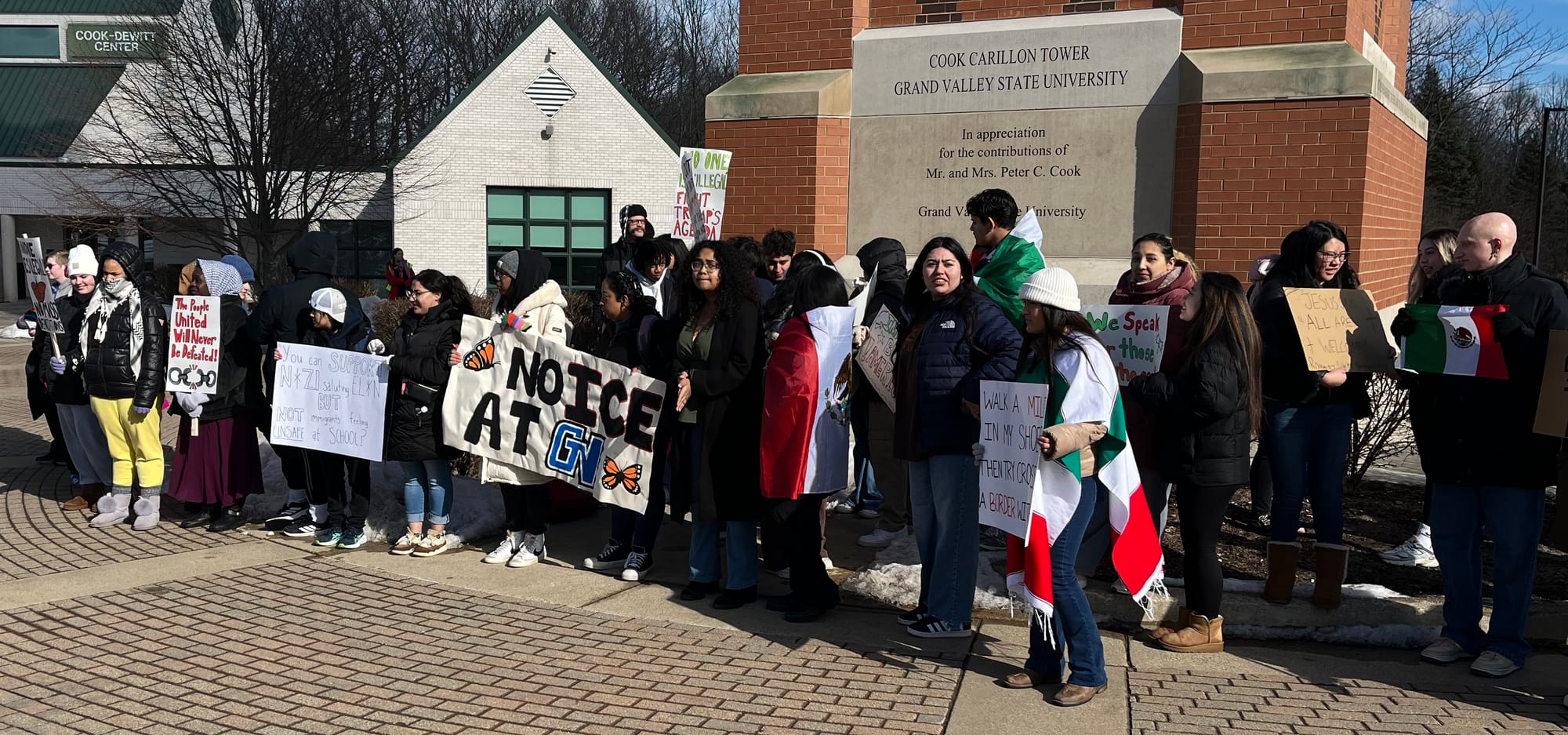
The protest, which gathered under the Cook Carillon Tower, was in response to rumors that the U.S. Immigration and Customs Enforcement, otherwise known as ICE, was coming to Allendale.
Standing outside in below-freezing temperatures, the crowd listened to several speakers denounce the new immigration policies, and later the large group marched around campus chanting: “Say it once. Say it twice. We will not put up with ICE.”
Grand Valley State University students protested West Michigan immigration raids on Friday, Feb. 7, 2025. [Video/Christopher Thome]
The Progressive Student Union organized the protest, with help from the Latino Student Union. Both said they are prepared to put on more demonstrations.
“We are here to stand against ICE being in our community,” said Danahe Garcia Navarro, president of the Latino Student Union. “We are also here to support anyone in our community that may be affected.”
Residents march in Lansing
Protesters coordinated simultaneous state capitol demonstrations Wednesday, Feb. 5, in several states, including Michigan, California, Minnesota, Texas, Wisconsin and Indiana.
The protests were a result of a movement that has organized online under the hashtags #buildtheresistance and #50501, which stands for 50 protests, 50 states, one day. Websites and accounts across social media issued calls for action, with messages such as “reject fascism” and “defend our democracy.”
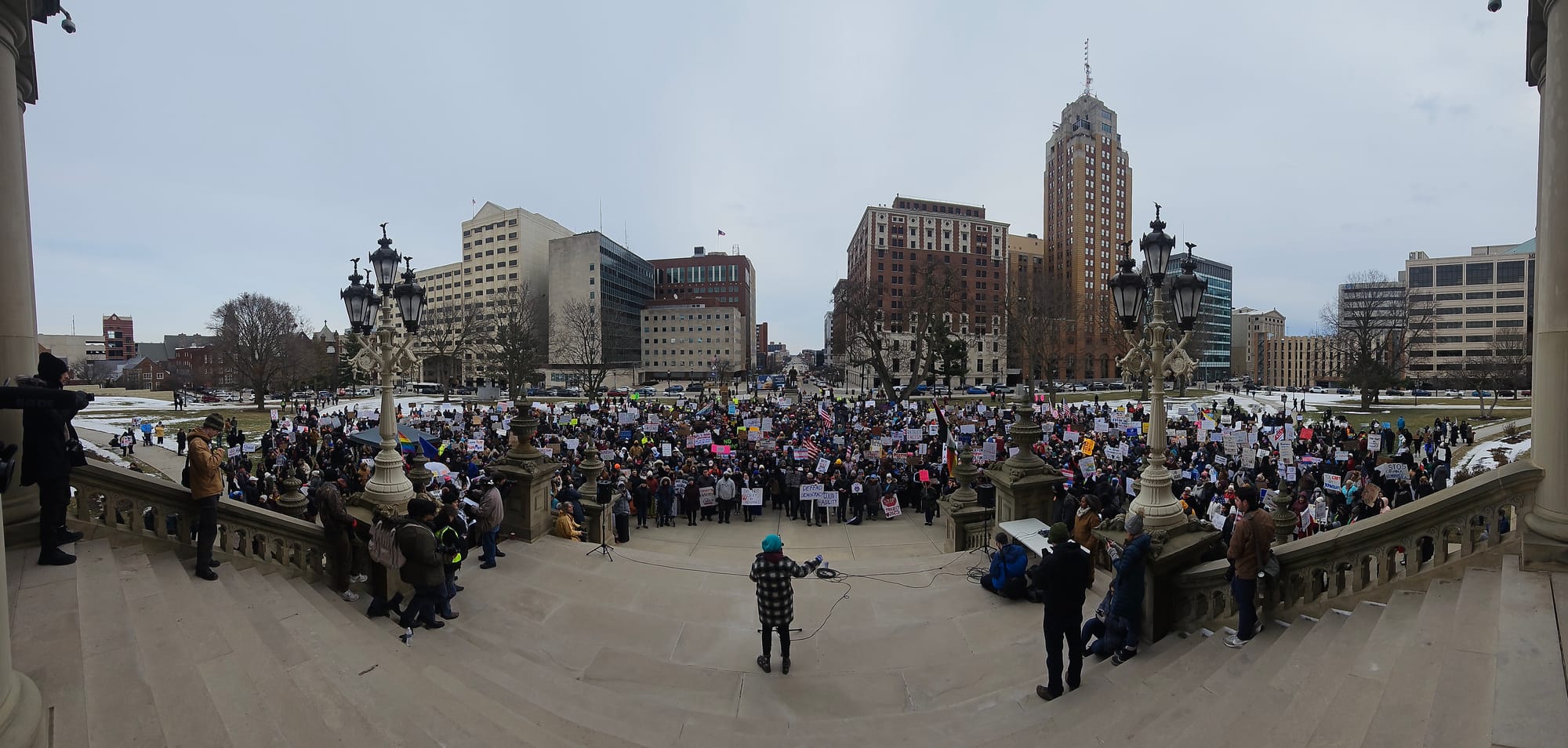
In Lansing, more than 1,000 demonstrators waved signs denouncing Trump as well as billionaire Elon Musk, the leader of Trump’s new Department of Government Efficiency and Project 2025.
Grand Haven native Sam Nelson helped co-organize the event.
“I grew up on the west side of the state. Some of you might know what that means, or the kind of things you hear growing up, and the kind of hate that gets spread in different communities. My parents … they work in the restaurant business. They don't have a retirement account. I'm looking out for them,” Nelson, told demonstrators at the capitol event.
He urged the crowd to not be fooled by the frenetic pace at which Trump is issuing policy changes.
Sam Nelson addresses demonstrators on Wednesday, Feb. 5, 2025, during a protest at the Lansing state capitol building. [Video/Joe Spaulding]
“You have Trump talking about an illegal occupation of Palestine. You have an executive order talking about gender essentialism — these are all divide-and-conquer tactics. We are all working class here, and that means taking action, because there's more of us than there are of them,” he said.
Nelson, 26, works as a legislative aide to a Democratic lawmaker in the Michigan House of Representatives.
He said he hopes the capitol demonstrations inspire citizens to get more involved and make their voices heard.
“To quote the pretty relatively famous line from Bernie Sanders: ‘Are you willing to fight for someone you don't know?’” Nelson said in a Friday interview with Ottawa News Network.
He said he wants people to learn about various ways of voicing dissent against the administration, including “urging people to learn about different types of protest action.”
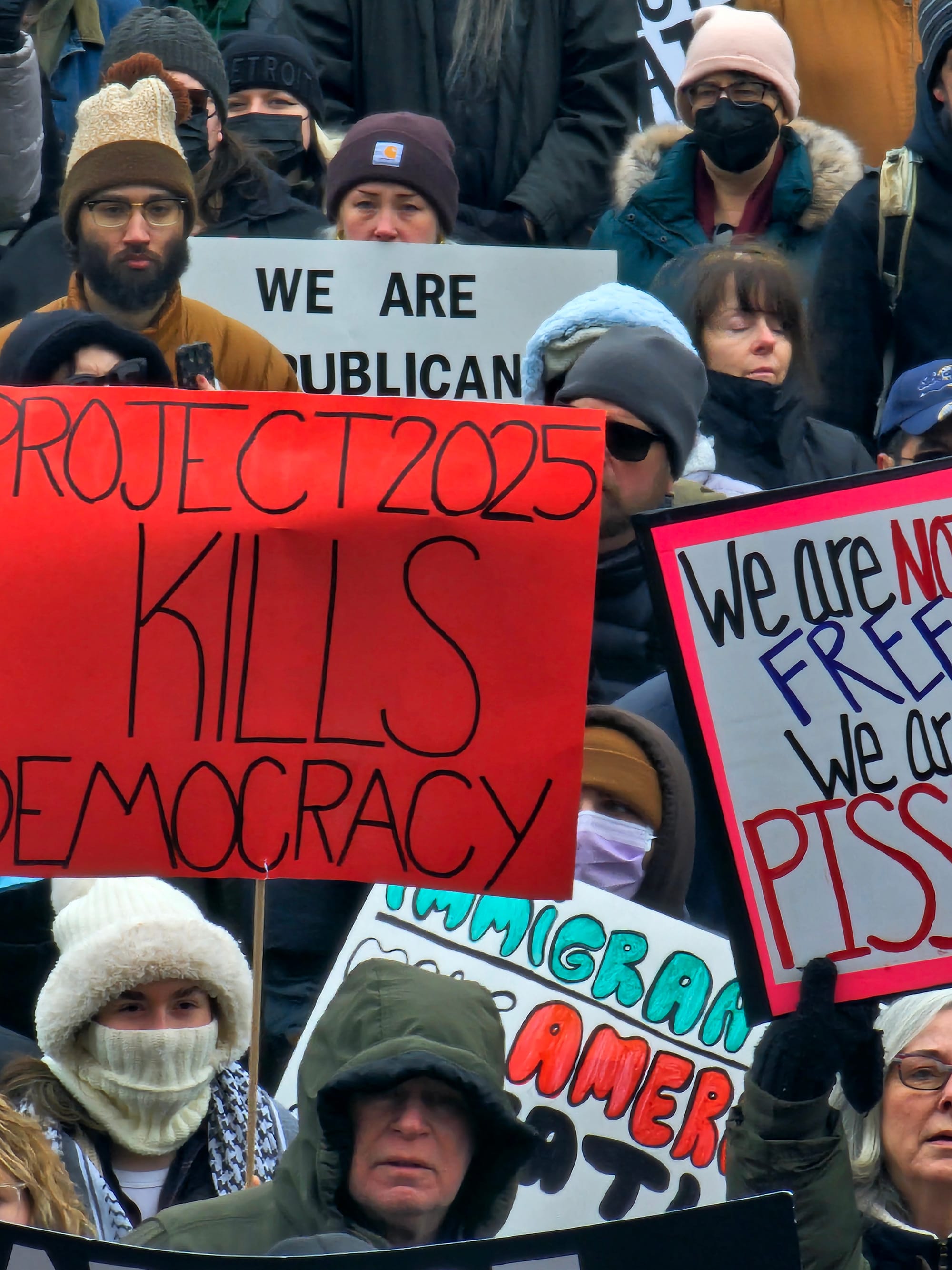
“A rally is great, that's a start, but what about strikes and civil disobedience, like sit-ins? There's a lot more disruptive things people could do to show their dissent,” he said.
“I think if there are people who are willing and able to drop everything with a couple of days' notice and show up for something at the state capitol, that's beautiful. But if there is a detention center being built in Michigan, or is a school board trying to ban books … if we can turn the energy into 300 people showing up for public comment when they're used to one or two, that sends a huge message. That's where this is kind of where one network of many different activist networks can play a role,” Nelson said.
He said it can be frustrating when the average voter only engages during presidential election cycles.
“The average person gets a sense of political stakes once every four years,” he said. “I feel like people don't have a sense of stakes. It definitely comes from some degree of privilege. People like myself, where the political stuff can start out as a hobby or be part of what you do and end up consuming your whole life — we're always going to have that kind of activist cadre. That's not a bad thing … but I think about my non-political friends and there's just this sense of disenfranchisement.”
Part of the challenge, Nelson said, is the lack of a comprehensive political system where local, county and state leaders advocate for their residents.
“Where are the mayors and other small elected officials on the state level, who are really fighting for young people who feel a sense of bleakness?” Nelson said. “We have a climate catastrophe, most people think that they're never going to be able to own a home … but the voices fighting for it are so far and few in between.

“It feels like the political messaging in this country is just so incoherent, and then there's very few people who break through the noise. We don't have enough people fighting for that consistently in a way that they're actually trying to reach out to people, especially in Michigan,” he said.
He explained that Project 2025 is not so unusual when taken in the context of more aggressive politics nationally.
“The Heritage Foundation has always put out these white papers. Both parties do this when they're not in power in D.C.,” he explained. “During the Biden Administration, if you are adjacent to Republican politics, then all you can do is prepare for when you're in power again.”
The difference with Project 2025, he said, was that it could give unprecedented power to the executive branch with no checks or balances.
“The concern that I've had with it is that it plays into this decades-long bipartisan escalation of creating the unitary executive … of effectively undermining the power of the judiciary and the legislature — that Congress is just an afterthought, and that whoever's president for four years has just absolute unilateral authority,” he said.
He said short-sighted decisions — such as Musk’s DOGE efficiency task force — could have long-term consequences that would affect millions of citizens.
“You think about these things that you take for granted. Your weather data is collected and collated through the (National Oceanic and Atmospheric Administration) … well you can say goodbye to that,” Nelson said. “If the rest of this dismantling of the federal government continues, people you love, collecting Social Security and having access to Medicare or Medicaid, that's being threatened now, too.
“Sure, it's in the name of efficiency, but it's unacceptable that anyone you know spends a night out on the streets or wonders where they're going to get their medication next,” he said.
Even decisions like Trump ordering a halt to all aid in South Africa — over what he called a human rights violation against a white minority group — has unintended ripple effects for Americans, Nelson said.
“For the United States and other countries that we have interdependent relationships with … then all of a sudden we pull funding and there's an increase in HIV and AIDS in Africa … that has consequences for the economic and social health of countries that we trade with,” he said. “That has public health consequences on the virus impacting Americans. There are these strong moral cases for it too, right? You know, we're the wealthiest country in the history of the world, and I'd love to see us take care of as many people as possible, but the cutting of these policies in the name of efficiency are only going to end up costing you more in the long run.”
Nelson called attention to recent political upheaval in Ottawa County, after far-right fundamentalist group Ottawa Impact had a ruling majority of the county board of commissioners that led to seven lawsuits and millions in unplanned spending.

He said Ottawa Impact was a bellwether of the national political landscape.
“The Ottawa Impact project is absolutely the same as Project 2025 and Elon Musk’s DOGE office,” Nelson said. “It’s this myth of running government like a business. It's never worked like that.”
He said the concept of promoting political outsiders like Trump is a right-wing tactic that can be effective, but doesn’t bear out as successful long-term.
“They find all sorts of anti-social types at school board meetings who are fed up, and they astroturf them to get them onto a county commission and mess around with a local budget to see how well this could work nationally,” he said. “There’s the cliche about thinking globally and acting locally. You find the wisdom in things like that. Whatever projects they're trying nationally and internationally connect right back home.
“Why should I care about what's going on in little old Grand Haven or my corner of Ottawa County? That struggle is connected to what people are doing throughout the state, throughout the country, globally — it is that crucial,” he said.
What can people do?
Leslie said becoming politically active can be intimidating.
“A lot of it is people don't know where to start, and I think a lot of that pertains to America's individualism due to capitalism. Everybody's kind of focused on ‘How does this affect me?’ They're not thinking of their neighbors,” she said.
“I think community is going to be the very best place to start because this is going to hit us all. It's not just going to be any one person. Look to marginalized communities, seeing what their issues are. As white people, it's our job to amplify those voices. We don't want to speak over them or speak for them. We just want to amplify it.”
Nelson agreed.
“If you're seeing something frightening or scary in the news, you have to remember other people are seeing this too. There are other people who care. And that leads to finding other people,” he said. “There are political organizations of all types in every single corner of the state.”
Want to get involved?
Looking for a way to join a local protest? Try visiting the following links to get involved:
• Organize Ottawa works to connect people with their districts. The site also will connect residents to specific hyperlocal groups tied to progressive politics in Ottawa County's 11 subdistricts.
• Facebook features several local groups that address local politics, such as Ottawa Objects, to statewide and national issues, such as Progressive Lakeshore, Yes! There are liberals in West Michigan! and Ottawa County Dems and Friends - Michigan.
• Since the results of the 2016 election, many people have been looking for ways to productively communicate their political positions. 5 Calls, a new nonprofit app and website created by a group of volunteers, provides an efficient pathway for contacting senators and representatives.
• Thinking about organizing your own protest? The Activist Handbook offers a step-by-step guide on how to plan. If you are attending your first protest, the American Civil Liberties Union offers a guide to knowing your rights.
He said even though voters opted not to re-elect most of Ottawa Impact’s candidates in the 2024 election cycle, residents need to stay motivated.
“I know Ottawa County's had a lot of resistance because of Ottawa Impact; there's been coalitions there … but we live in a really lonely, alienated time,” he said.
He said finding local groups to make connections is a great step.
“And whether it's a book club that's more oriented towards reading … not even necessarily explicitly political stuff, but historical stuff, stuff that broadens your horizons to more explicit political groups,” Nelson said. “You have to find these other institutions to connect with other people, because you can't just sit alone at home and be worried because you're going to drive yourself mad.”
Leslie said the key is to seek connections and understanding.
“I think the most important thing is people really have to talk to each other,” she said. “There's plenty of people who voted for Trump and already feel betrayed, like our elders or Middle Eastern people who voted for him because of how the Biden Administration handled Gaza. And I am hoping that it will bring the communities together to give us the unity that we need.
“Because I really think this is less of a racial fight and more of an economic one, because we shouldn't be pitted against each other based on our differences. It should really just be average Americans versus the rich at this point — that's my opinion,” she said.
Support Our Work
Ottawa News Network is a nonprofit news service dedicated to providing the residents of Ottawa County with trustworthy, community-driven news. ONN treats journalism as a public good — something that enriches lives and empowers Ottawa County’s 300,000-plus residents to stay engaged, make informed decisions, and strengthen local democracy. Please consider giving today.
As a political newcomer, De Ridder said she started small with her friends and neighbors.
“Reach out to people just say, ‘How are you doing? How can I help?’ And just listen to what those stories are,” she said. “The next thing is, when those opportunities present themselves, when there's going to be an equality demonstration … show up. Paint a sign, get some markers out, say what is on your heart so that other people can see visibly why you are there. I think that those are really easy, actionable steps.
“So maybe it isn't always that you have a group behind you, or that you are making a big impact. But even just those small, visible ways of demonstrating what you're doing, you don't know who you're influencing and who you're inspiring,” she said.
— Sarah Leach is the executive editor of the Ottawa News Network. Contact her at sleach@ottawanewsnetwork.org. Follow her on Twitter @ONNLeach. Christopher Thome covers business and development for Ottawa News Network. Contact him at cthome@ottawanewsnetwork.org.


